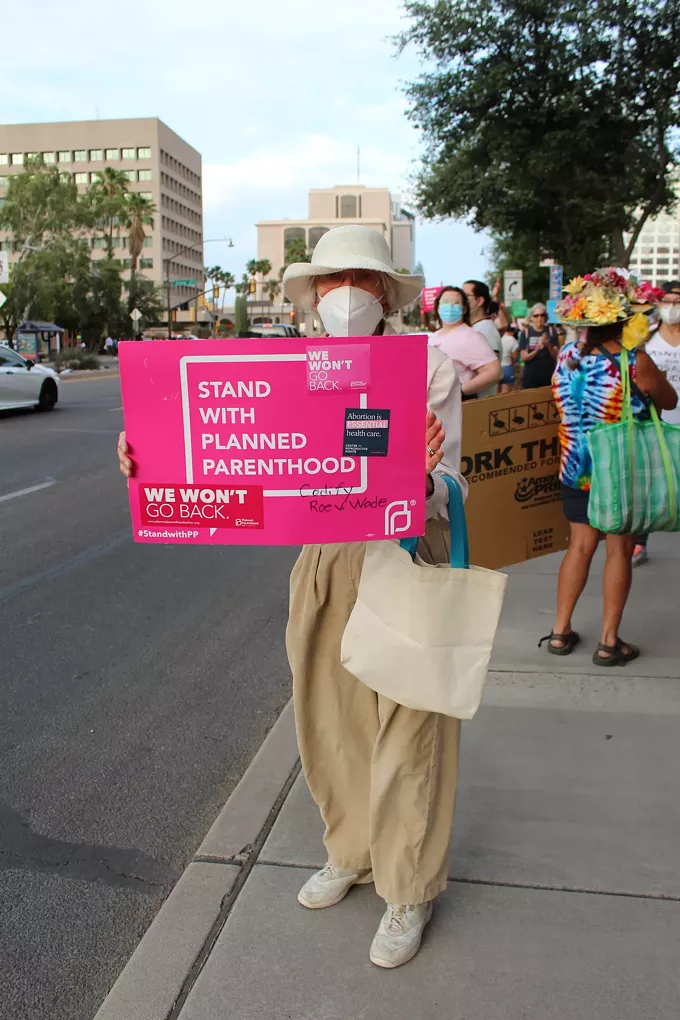
It has been a little more than a month since the local grassroots organization, Arizonans for Reproductive Freedom, fell short of signatures for its pro-choice ballot initiative on July 7, but its efforts were not in vain.
The pro-choice organization, which was founded the day after the Alito leak, successfully mobilized more than 3,000 statewide volunteers in support of reproductive health care who collected more than 175,000 signatures in hopes of submitting a ballot initiative to protect abortion access.
Averaging about 2,700 signatures a day over the course of 61 days, Arizonans outpaced Michigan, which started its efforts two years ago.
Arizona ultimately needed a total of 356,467 signatures to have made it to this November’s ballot.
“I want people to understand that this was phase one and it didn’t work,” said Amy Fitch-Heacock, one of the co-founders of Arizonans for Reproductive Freedom. “But that doesn’t mean that phase two will be unsuccessful.”
Since the final Dobbs ruling on June 24, the “interest in the campaign exploded,” according to the organization.
“A lot of the genesis of what we were doing was strategizing from a legal standpoint,” said Shaq McCoy, one of the co-founders of Arizonans for Reproductive Freedom.
A group of community members who met nightly via Zoom determined that a constitutional amendment was the most impactful way to go. Some committee members which consisted of public policy advocates, also included physicians and abortion providers who were concerned about their ability to care for their patients.
The Dobbs ruling had impeded miscarriage management and even contraceptive health care.
“I didn’t think that I would get messages from female friends saying, ‘My doctor doesn’t feel comfortable renewing my IUD,’” Fitch-Heacock said.
“There are going to be effects that we don’t even see yet,” McCoy said.
Substantial uncertainty being one of them.
Less than a week after the Supreme Court overturned Roe v. Wade, Arizona’s Republican Attorney General Mark Brnovich took to Twitter, promoting a Civil War-era ban against all abortions.
The 15-week ban that was passed by state legislature in March, repealed the first part of the 1901 law: the prosecution of any individual who sought or aided and abetted an abortion. The ban, which was set to go into effect in late September, or 90 days since the legislative session ended, “does not supersede any previous bans in the event that Roe is overturned,” Fitch-Heacock said. “It is a very questionable legal status.”
In July, the Pima County Board of Supervisors voted 4-1 to adopt Resolution 2022-40, a provision in support of access to abortion services in the interest of public health.
At odds with Arizona’s Republican Gov. Doug Ducey, Brnovich, who ran for U.S. Senate, moved to re-impose the pre-statehood ban in a 16-page filing on July 10 at a Pima County courthouse.
“We really are leaning on the strength of the Arizona voter base, who has overwhelmingly said, ‘this is what we want, you’ve gone a step too far in banning abortion,’” Fitch-Heacock said.
Laura Conover, the Pima County attorney who has come out publicly in support of not prosecuting anyone who is aiding or seeking an abortion, most recently sided with Planned Parenthood in its lawsuit against Brnovich’s motion to reinstate the near-total ban.
Conover took to Twitter on July 23 and said, “In 1973, my office opposed Planned Parenthood, who was seeking an injunction (protection) against prosecuting abortions while awaiting the Roe decision. Yesterday, I reversed course.”
While state lawmakers continue to hash out politics, Arizonans for Reproductive Freedom will have to wait until after the upcoming November election to file for a new ballot initiative for the 2024 season.
“As we pivot to a long-term strategy, it’s keeping those folks engaged and bringing more people on board statewide because the energy and momentum is still there statewide to do something,” McCoy said.
To get involved in the movement visit, azreproductivefreedom.com

